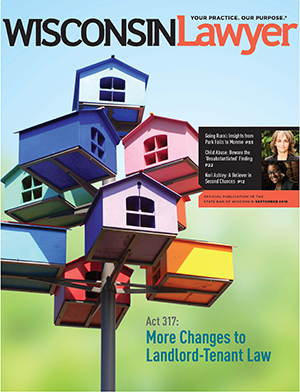 Sept. 12, 2018 – Kori Ashley works to improve the lives of young Milwaukeeans entangled in the criminal justice system. Where is her belief in second chances grounded? A finding of “unsubstantiated” child abuse might not mean the child suffered no harm. If that’s the finding, what happens next? With recent catastrophic weather and other emergencies, now is a good time to support first responders with basic estate planning documents. What does the #MeToo movement have to do with lawyers? You’d be surprised … or not. The September Wisconsin Lawyer explores these and other matters.
Sept. 12, 2018 – Kori Ashley works to improve the lives of young Milwaukeeans entangled in the criminal justice system. Where is her belief in second chances grounded? A finding of “unsubstantiated” child abuse might not mean the child suffered no harm. If that’s the finding, what happens next? With recent catastrophic weather and other emergencies, now is a good time to support first responders with basic estate planning documents. What does the #MeToo movement have to do with lawyers? You’d be surprised … or not. The September Wisconsin Lawyer explores these and other matters.
The Benefits of Living and Working Where Your Clients Live and Work
For Kori Ashley, living and working where most of her clients do helps her understand the intricacies of Milwaukee that her clients experience every day, and increases her ability to deliver highly effective advocacy work on their behalf. In “Kori Ashley: Empowering Self-sufficiency, A Believer in Second Chances,” she explains why she’s passionate about building better neighborhoods by trying to improve the lives of young people entangled in the criminal justice system and guide them to a second chance for themselves, their families, and their communities.
Understanding Definitional Distinctions
In “Child Abuse: The ‘Unsubstantiated’ Finding,” Lori Kornblum and Daniel Pollack explain just as a not-guilty verdict does not necessarily indicate a defendant did nothing wrong, a finding of unsubstantiated child abuse might not mean the child suffered no harm. Tens of thousands of unsubstantiated instances of child abuse occurred in Wisconsin in 2016. But the unsubstantiated finding wasn’t the end of the story for the individuals involved. A case involving Suzanna (a pseudonym) is one recent example.
More Changes to Landlord-Tenant Law
Lawyers for commercial and residential landlords and tenants must be ready to follow the new and revised statutory provisions, most of which took effect April 18, 2018. In “Act 317: More Changes to Landlord-Tenant Law,” Tristan Pettit and Jennifer Hayden identify the act’s most significant changes, including clarification of laws regarding assistance animals, including emotional support animals in rental housing, responsibility for repair costs, rent abatement, restrictions on removal of CCAP information, credit and background checks, and contested evictions.
Celebrating the Creation of the U.S. Justice Department
When Wisconsin was thrust into the national limelight in a fight over the Fugitive Slave Act, its early U.S. Attorney put himself firmly on the side of slave owners. In “Federal Attorneys: The Road Since the Civil War,” Steven Biskupic says that type of stance changed with the creation of the U.S. Department of Justice in 1870, which, under the direction of President Ulysses Grant and U.S. Attorney General Amos T. Ackerman, engaged in a battle to take down the Ku Klux Klan.
Other Columns
-
President’s Message: Chris Rogers, in “Fostering a Two-way Dialog,” says supporting you through member services and benefits and having an ongoing dialog with you are major areas of focus during his year as president.
-
Your State Bar: Throughout Wisconsin, law enforcement officers, firefighters, and emergency medical technicians are ready to respond to disasters at a moment’s notice. In “Everyday Heroes,” Larry Martin invites you to provide back-up support by volunteering for Wills for Heroes.
-
Solutions: In “Going Rural: Insights from Park Falls to Monroe,” Chris Shattuck says law practices in rural communities are shaped to serve the needs of the smaller community. Lawyers in Monroe and Park Falls share their stories.
-
Ethics: In “Joint Representation: How to Bill Clients,” Dean Dietrich says the Rules of Professional Conduct include provisions for the joint representation of clients.
-
Solutions: Harassment and discrimination occur in all types of workplaces. In “#MeToo Marks a Changing Tide for Employers,” Julia Arnold gives tips lawyers should share with their employer-clients as well as consider adopting for their own workplaces.
-
Reflections: In “How to Explain What You Do to a 4 Year Old,” Deanne Koll says the answer may best be found in lawyers’ off-the-clock activities.
-
Solutions: Sharon Nelson and John Simek, in “Credit Card Processing: Are You Compliant?,” explain if you accept payment by credit card (and you should), you must ensure your computer system is compliant with new security requirements.
-
Technology: In “Thriving Amid Constant Change,” Tom Watson says opportunities abound for lawyers who invest in technology and adjust to consumers’ expectations.
-
Solutions: Cynthia Herber, in “Comprende? Tips for Using Interpreters,” explains how to work with clients with limited English proficiency.
-
Final Thought: Students have as much to teach as do instructors. Kene Okocha offers a case in point in “Learning While Teaching.”
Check out the September Wisconsin Lawyer.
